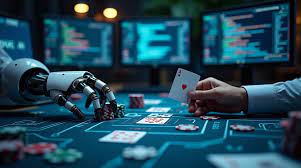Initially developed for video games, AI technologies have greatly influenced poker bots and created an unexpected link between two seemingly unrelated areas. Both fields involve strategic decision-making, complex interactions, and dynamic real-time responses. This has led to AI-driven poker systems that can defeat human professionals, optimize gameplay, and help maintain a fair and competitive environment within online poker platforms.
Advanced Strategies and Algorithms in Poker Bots
Poker bots have evolved from basic decision-making programs into highly advanced AI entities capable of competing at the highest levels. The key to this lies in algorithms initially crafted for game AI, such as Counterfactual Regret Minimization (CFR). CFR allows poker bots to learn optimal strategies by playing against themselves. This algorithm was essential in developing poker bots like Libratus and Pluribus.
Pluribus, developed in 2019 by researchers from Facebook AI and Carnegie Mellon, is an early example of such capability. It was designed through self-play, teaching itself to play poker games online without needing human guidance or pre-programmed strategies. Pluribus demonstrated impressive strategic acumen in tests against professional players, including those who had previously won the prestigious World Series of Poker. It managed to defeat multiple top-tier players in one-on-one games and handled more challenging six-player matches. Notably, Pluribus could accumulate winnings at a rate of approximately $1,000 per hour, proving its financial effectiveness and technical expertise. Its ability to perform with far fewer computational resources than older bots marked a breakthrough in the practical application of AI within the gaming field.
The real-world impact of CFR goes beyond its technical design. It operates within the constraints and complexities of poker that involve incomplete information and a mixture of skill, strategy, and luck. Poker bots using such algorithms develop the ability to make more consistent, high-value decisions than their human opponents. Strategic adaptability and resource efficiency make CFR one of the most compelling algorithmic models for AI research in poker.
Real-Time Strategy Adaptation and Personalized Gameplay
Modern poker bots leverage key characteristics of video game AI to create deeper experiences. These bots use adaptive systems such as reinforcement learning and neural networks to refine their decision-making processes dynamically. Bots can recognize patterns in player behavior and adjust their strategies accordingly, making poker games more unpredictable.
One major advancement lies in the bots’ ability to simulate human-like behavior. AI bots replicate actions such as calculated bluffs, conservative betting, and higher-risk plays, which are often characteristic of professional players. Modern AI systems can recognize these patterns and convincingly replicate them in game scenarios. This provides a closer approximation to the mix of skill, psychology, and chance that makes poker a highly competitive game.
Custom-built poker bots can also be tailored to specific environments where they monitor user progress and adjust the game’s difficulty. Depending on performance, skill level, and playing history, users may encounter bots that adapt the pace and intensity of play. This offers a personalized playing route that ensures continual development and player engagement.
Maintaining Fair Play and Security
Poker bots help ensure fairness by detecting fraudulent activity. AI analyzes gameplay to identify statistically implausible patterns of cooperation, such as players manipulating bet sizes or folding in ways designed to deceive others at the table. These AI capabilities, originally designed to thwart manipulative tactics in competitive video games, play a pivotal role in safeguarding the integrity of online poker.
Additionally, poker bots use blockchain technology to enhance transparency. A decentralized ledger of transactions ensures that no suspicious actions go unnoticed. AI-driven detection systems further monitor in-game behaviors to identify software-based cheating, offering robust protection for both tournaments and casual play.
AI also enhances the security of online poker environments by managing game traffic in real time. Bots can simulate different device environments, like smartphones, to safeguard player identities while ensuring compliance with gaming regulations. For high-stakes games, where personal anonymity is critical, AI-based solutions provide an additional layer of protection by masking details such as IP addresses and GPS coordinates.
The Future: Immersion and Advanced AI
The fusion of AI with technologies like virtual reality (VR) and augmented reality (AR) is also changing how players engage with poker. Immersive environments now allow users to feel as though they are at a real table, with AI driving many elements of these virtual poker rooms. These technologies could make online poker more engaging by simulating real-life scenarios and interactions.
Advances in real-time analytics and opponent modeling could lead to even more realistic and complex strategies in future AI-based poker systems. For casino operators, AI-powered variance reduction algorithms, such as AIVAT, are game changers. By reducing the impact of luck in poker, these algorithms create more predictable outcomes and distinguish genuine skill from mere good fortune.
The ethical considerations surrounding advanced poker bots will also shape the future of AI in this field. Developers must ensure that these systems are used to improve fairness and enhance player experience rather than creating undue advantages for specific users. Transparency and regulatory compliance will play an integral role in this evolution.
Conclusion
The cross-pollination of AI techniques developed for video games with poker bots has created a more competitive, adaptive, and secure environment for poker players. From the implementation of advanced algorithms like CFR to the development of immersive VR poker rooms, the influence of video game AI on poker is undeniable.
As AI continues to evolve, its applications in poker will only expand. Future innovations promise not only to enhance gameplay but also to protect the integrity of the game, ensuring fairness and security for players worldwide. By blending cutting-edge technology with strategic depth, poker bots are setting a new standard for competitive gaming. The ongoing development of AI-driven poker systems highlights how innovation in one domain—video games—can revolutionize another, offering exciting possibilities for players and developers alike.

